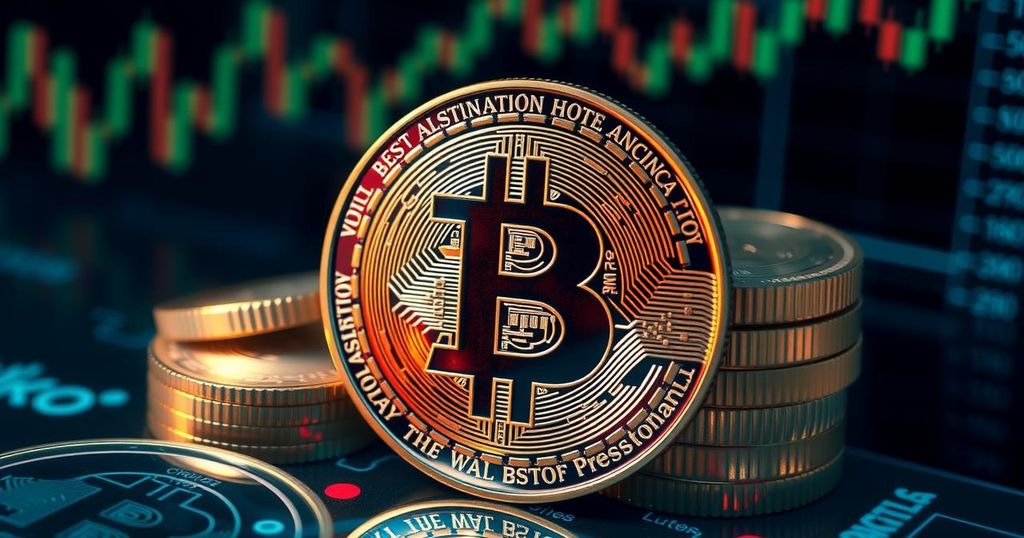Bitcoin’s Surge: Economic Ramifications and Federal Reserve Concerns
Bitcoin has dramatically risen to over $106,000 as the U.S. braces for a potential economic shift. Analysts warn of stagflation in 2025, driven by inflation concerns and a possible debt crisis. The Federal Reserve may cut interest rates, influencing market dynamics whilst raising fears of stagflation. Prominent figures in the investment community express caution about the strengthening cryptocurrency market and its implications.
The price of Bitcoin has surged dramatically, surpassing its previous all-time high and reaching over $106,000, following indications from incoming U.S. President Donald Trump regarding a significant policy shift related to cryptocurrency. This monumental increase has seen Bitcoin more than double since the lows experienced in August, bolstered by remarks from prominent figures such as Tesla CEO Elon Musk, who has expressed skepticism regarding the viability of the U.S. dollar.
A recent leak reveals that Russia may be poised to establish a Bitcoin reserve ahead of the United States, leading analysts to caution that the Federal Reserve’s “biggest nightmare” could materialize in 2025. Analysts from The Kobeissi Letter have warned that stagflation—a scenario marked by economic stagnation paired with escalating inflation—is increasingly likely. They reference a report from Apollo Global Management, anticipating a resurgence in inflation in 2025 without the Fed’s anticipated rate cuts to alleviate economic pressures.
In parallel, investment tycoon Ray Dalio has sounded alarms about a looming debt crisis which he believes will contribute to the devaluation of the U.S. dollar. The national debt has escalated to over $34 trillion, exacerbated by pandemic-related financial stimulus measures contributing to soaring inflation rates in 2022. Consequently, the Federal Reserve has been compelled to raise interest rates rapidly, creating concerns of a debt spiral driven by mounting interest payments.
As of December 18, there are expectations that the Fed will implement a 0.25% rate cut during its upcoming policy meeting, with a 95% probability assigned to this outcome. However, statements from Fed Chair Jerome Powell could reshape the anticipated trajectory of monetary policy for the upcoming year, prompting traders to remain alert. Haider Rafique, the Chief Marketing Officer of XBTO, advises vigilance due to the multifaceted influences on Federal Reserve decisions, including inflation metrics and overall economic resilience.
The narrative surrounding Bitcoin’s exponential growth is intertwined with broader economic concerns regarding inflation and the future of monetary policy in the United States. Bitcoin, originally conceived as an alternative currency, has gained traction as a potential hedge against inflation amidst rising concerns about excessive government spending and national debt. The dynamics between traditional financial frameworks and cryptocurrency are increasingly relevant as investors reassess their positions in light of evolving fiscal strategies. Potential geopolitical shifts, such as Russia’s pursuit of a Bitcoin reserve, raise questions about the relative positioning of major currencies and the long-term implications for the U.S. dollar, which is viewed as a global reserve currency. As the Federal Reserve contemplates interest rate adjustments, the cryptocurrency market is closely monitoring these developments as they could significantly influence Bitcoin and overall market stability.
In summary, Bitcoin’s recent ascent above $106,000 signals a significant shift in market sentiment, influenced by economic instability, inflationary pressures, and potential policy changes in the United States. The Federal Reserve faces heightened challenges as stagflation concerns loom on the horizon. This combination of factors suggests a critical period ahead for both the cryptocurrency market and the traditional financial landscape, necessitating close scrutiny from investors as they navigate the evolving economic environment.
Original Source: www.forbes.com







Post Comment